A Journey of Empowerment, Learning, and Shared Leadership Across the Hills of Nepal
Introduction – A Journey Beyond Borders
At the break of dawn on May 15, 2025, sixty women from the Jitpurphedi Women’s Agricultural Cooperative Ltd. boarded a bus bound for Okhaldhunga. With blue scarves around their necks and hopeful hearts, they weren’t just setting off on a field visit—they were sowing the seeds of sisterhood, resilience, and leadership. This four-day exchange, organized by Volunteers Initiative Nepal (ViN), marks a milestone in ViN’s journey of over 18 years of catalyzing women empowerment programs across Nepal.
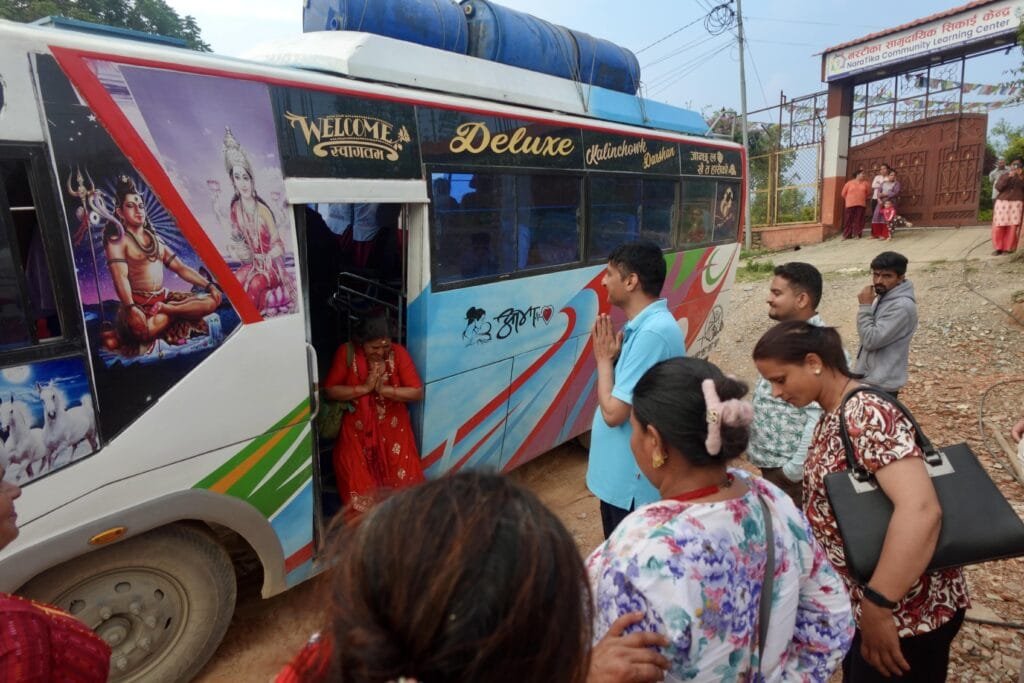 What made this journey exceptional wasn’t just the itinerary but the vision—a vision where empowered women empower women across geography, class, and culture. This wasn’t a top-down seminar. It was a peer-to-peer, rural-to-rural learning experience between cooperatives rooted in mutual respect, shared struggles, and community pride.
What made this journey exceptional wasn’t just the itinerary but the vision—a vision where empowered women empower women across geography, class, and culture. This wasn’t a top-down seminar. It was a peer-to-peer, rural-to-rural learning experience between cooperatives rooted in mutual respect, shared struggles, and community pride.
Who Are These Trailblazers?
The Jitpurphedi Women’s Agricultural Cooperative Ltd.
Formed with the facilitation and long-term support of ViN, the Jitpurphedi Women’s Agricultural Cooperative stands today as a beacon of what collective willpower can achieve. What began as a small savings group in Kathmandu’s outskirts has grown into a registered cooperative boasting over 83 million Nepalese rupees in transactions. With training in Microfinance for women in Nepal, leadership, and governance, the women have learned to manage everything from loan portfolios to seasonal farming strategies.
“We didn’t just learn how to run a cooperative,” said Sita Chalise, one of the founding members. “We learned how to run our lives differently—with confidence, voice, and vision.”
The cooperative is now legally recognized, member-managed, and financially independent. Through ViN’s Women’s Education Nepal and capacity-building initiatives, members have also taken on roles in women’s entrepreneurship Nepal and Social entrepreneurship Nepal.
A Warm Welcome in Okhaldhunga – Meeting Their Sisters in Change
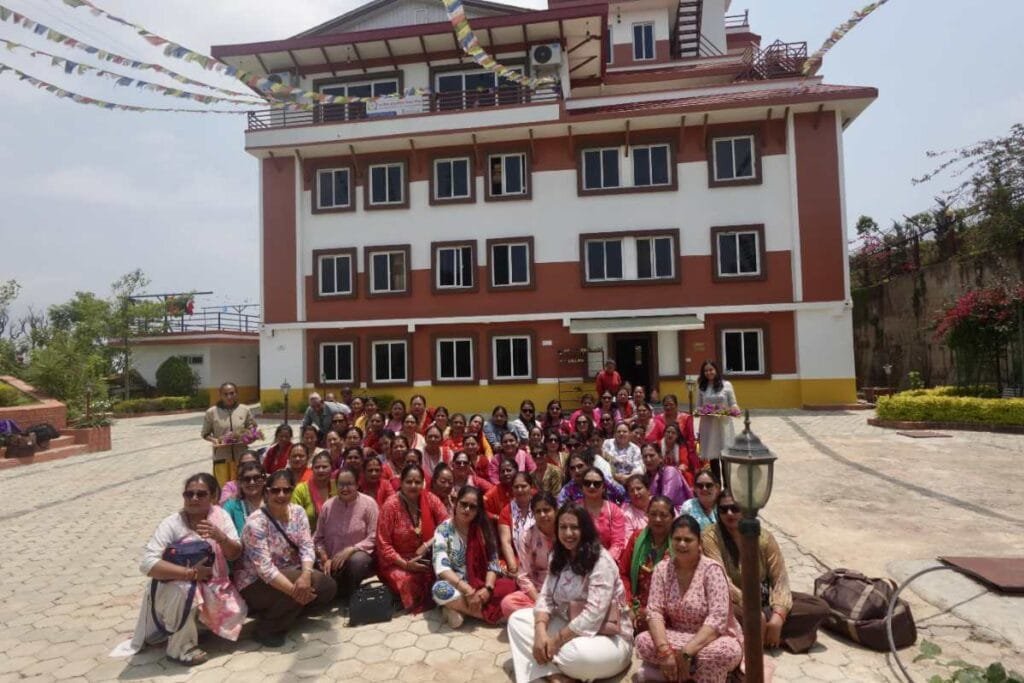 May 16, 2025: From One Hill to Another
May 16, 2025: From One Hill to Another
Upon arrival at NaraTika Community Learning Center (NTCLC), the women from Jitpurphedi were greeted by 60 women from three dynamic rural cooperatives:
- Taluwa Women Multipurpose Cooperative
- Saraswoti Women’s Agriculture Cooperative
- Bhadaure Women’s Agriculture Cooperative
Though from different districts, the bond was instant. Songs, garlands, and laughter set the tone for a transformative rural exchange. The program, designed around ViN’s participatory learning approach, revolved around shared experiences in Sustainable agriculture in Nepal, cooperative governance, Microfinance for women in Nepal, and Women’s leadership in Nepal.
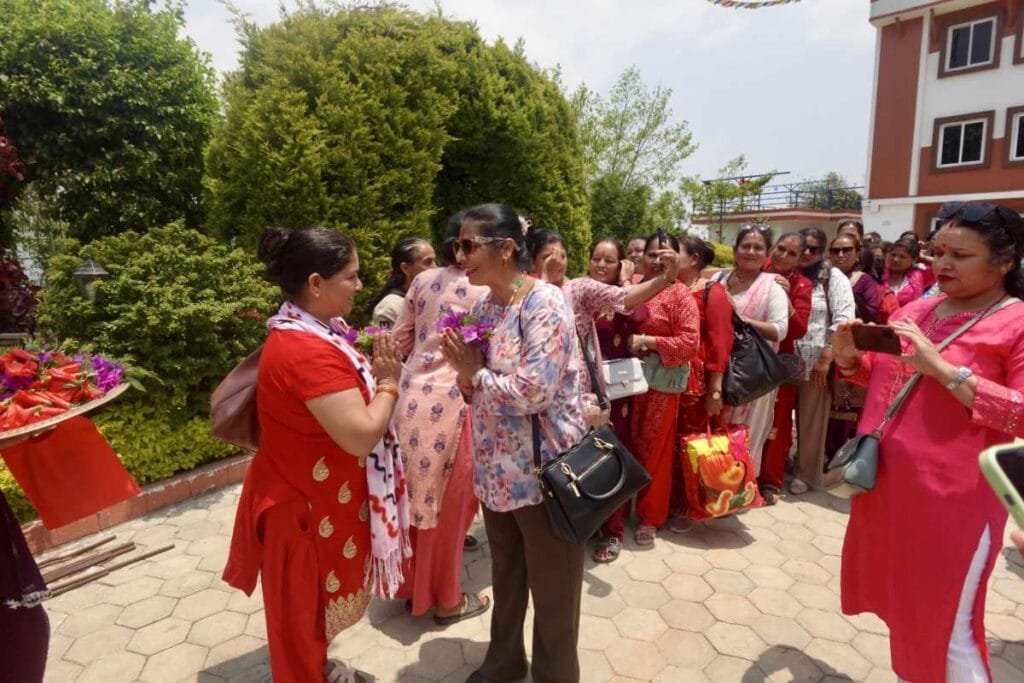 “This felt like coming home,” said Sarita Dhakal, a Jitpurphedi participant. “They may live on the other side of the hills, but their dreams, pain, and strength are all the same as ours.”
“This felt like coming home,” said Sarita Dhakal, a Jitpurphedi participant. “They may live on the other side of the hills, but their dreams, pain, and strength are all the same as ours.”
“I never thought our small cooperative in Bhadaure could teach others,” shared Man Kumari Lamichhane, a host member. “But today, I realized, we are all teachers and learners.”
This spirit of horizontal learning—Volunteer women empowerment—brought the abstract ideals of empowerment into daily reality.
Growing Roots of Solidarity – Key Themes of the Exchange
Economic Empowerment: Shared Savings & Credit Systems
One of the foundational themes was strengthening savings and micro-lending models. Participants dissected their existing savings groups, reflected on empowering women through microcredit, and engaged in SWOT workshops. A recurring highlight was how even small monthly deposits from women members grew into powerful capital for collective advancement.
“When we invest in each other, we invest in our children’s future,” shared Shanti Aryal during the collaborative SWOT presentation.
Sustainable Agriculture & Seed Exchange
Field visits to Taluwa and Saraswoti cooperatives revealed creative approaches to organic farming, composting, and seasonal crop rotation. Many groups expressed interest in replicating the local seed bank model pioneered in Okhaldhunga, furthering their commitment to Sustainable agriculture in Nepal.
Women’s Leadership in Practice
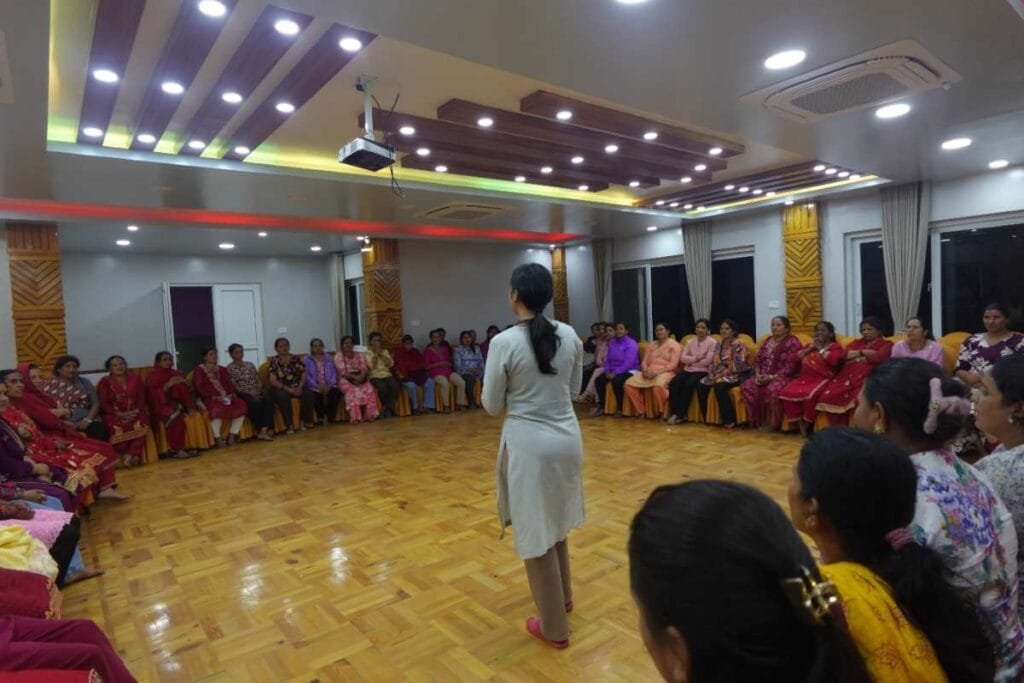 Leadership sessions explored the 7 Cooperative Principles, particularly democratic control, education, and community concern. Each cooperative group used SMART frameworks to develop their Vision–Mission–Goals (VMG) canvas. The emphasis on political neutrality in co-ops was especially resonant.
Leadership sessions explored the 7 Cooperative Principles, particularly democratic control, education, and community concern. Each cooperative group used SMART frameworks to develop their Vision–Mission–Goals (VMG) canvas. The emphasis on political neutrality in co-ops was especially resonant.
Hands-on gallery walks, sticker voting, and joint panel discussions encouraged collaboration and cross-pollination of ideas. The women pledged collective commitment through banner signatures, stating:
“We pledge to keep our co-operatives transparent, democratic & community-driven.”
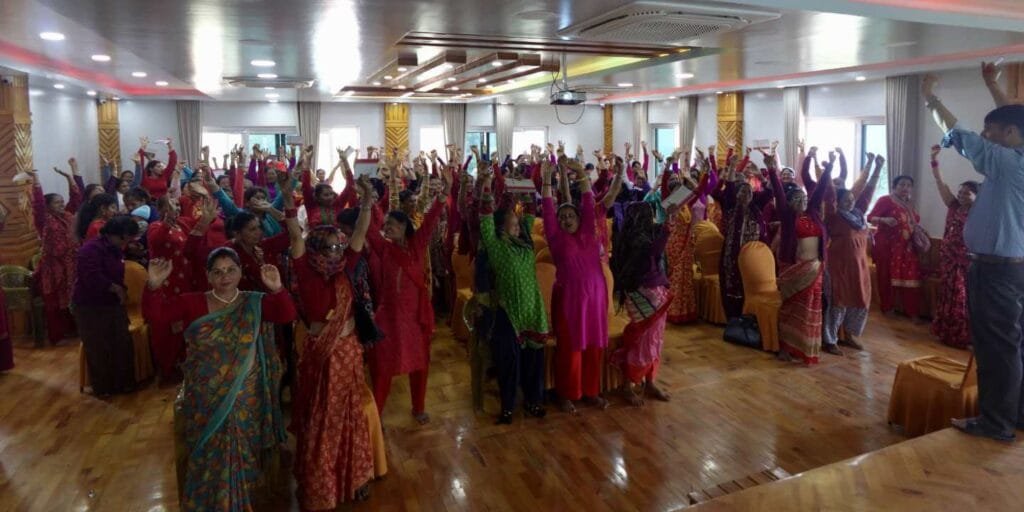 Photos captured women in vibrant discussion circles, sketching plans, exchanging produce, and dancing around the fire at night—moments that will soon be embedded in a collective memory collage.
Photos captured women in vibrant discussion circles, sketching plans, exchanging produce, and dancing around the fire at night—moments that will soon be embedded in a collective memory collage.
A Spiritual Pause – Pilgrimage to Halesi Mahadev
On May 17th afternoon, the delegation traveled to Halesi Mahadev, a revered pilgrimage site rich in spiritual and historical symbolism. For many, it was their first encounter with this sacred cave-temple, believed to be where Lord Shiva once meditated.
In the stillness of the Halesi cave, the women reflected on their journey. Candles flickered, prayers rose, and a sense of inner strength took root.
“Coming here was not just religious,” said one participant, “it was a personal awakening. Like our co-ops, the cave holds quiet power.”
The visit reinforced how culture, spirituality, and women’s solidarity are deeply entwined in rural Nepal’s social fabric. It offered a moment to pause, reset, and deepen the bonds of the emerging sisterhood.
More Than a Trip – A Movement in Motion
What set this excursion apart was not just logistics but intention. It wasn’t a one-time visit but a pilot for ViN’s broader initiative to nurture Community development, volunteering, and inter-cooperative solidarity across Nepal. Through rural exchange models like this, Volunteer Opportunities Nepal multiplies the impact of volunteer women’s empowerment efforts by fostering sustainable, peer-led transformation.
ViN didn’t just organize a trip; it cultivated a movement of women investing in each other’s growth. This event is a living example of Women’s cooperatives in Nepal evolving from isolated efforts to interdependent ecosystems. The value wasn’t just in what was taught but in what was shared—from kitchen garden tips to decision-making frameworks.
The Legacy of ViN – 18+ Years and Growing
Since its inception, Volunteers Initiative Nepal (ViN) has worked tirelessly to empower marginalized groups, especially women, through a holistic empowerment model:
- Education and Life Skills
- Microfinance for women in Nepal
- Entrepreneurship and Trafficking Prevention
- Volunteer teaching in Nepal and Youth Empowerment
ViN’s philosophy is simple but profound: local solutions with global solidarity. Their NGO support in Nepal has been rooted in respect, inclusion, and sustainability.
“This exchange represents what ViN stands for—grassroots wisdom, rural innovation, and the unstoppable power of united women,” said a ViN program coordinator.
Testimonials – Voices of Change
Shanti Aryal, Jitpurphedi:
“This trip showed me I’m not alone. Our challenges are shared. Now our solutions can be, too.”
Man Kumari Lamichhane, Bhadaure:
“I used to think we were behind. But I saw how much we have to give. That changed me.”
Sarita Dhakal, Jitpurphedi:
“This was a university without walls. Every woman I met was a professor of strength.”
ViN Facilitator:
“What we facilitated was logistics. They created a living lesson in gender equality, volunteering in Nepal.”
International Volunteer (from Canada):
“Years ago, I worked with these same women in literacy classes. Seeing them now as cooperative leaders? It’s why I keep supporting ViN.”
Looking Ahead – What’s Next for These Women?
As the women returned to their villages on May 18, 2025, hearts full and notebooks packed with reflections, the question naturally arose—what now?
In Jitpurphedi, cooperative leaders are already planning:
- Training replication workshops on SWOT analysis, cooperative governance, and climate-smart agriculture
- Launching a joint seed exchange program
- Publishing a shared newsletter highlighting cooperative innovation across the Okhaldhunga and Kathmandu districts
ViN aims to scale such peer exchanges across all its program sites, creating a national model of cooperative-to-cooperative mentoring. These next steps mark a new chapter for Rural women’s education programs and community organizing in Nepal.
“We will share this with our daughters and nieces,” said a young leader from Saraswoti Cooperative. “This is not just our story—it’s theirs, too.”
Conclusion – From One Village to Another, Hope Blossoms
From the winding roads of Kathmandu to the terraced fields of Okhaldhunga, the journey wasn’t merely geographical. It was emotional, political, and personal. These four days encapsulated what women’s empowerment programs should look like—real, relational, and rural-rooted.
As stories were shared, strategies exchanged, and songs were sung under starry skies, the agricultural cooperatives in the Nepal movement grew deeper roots. What began as a Volunteer Opportunities Nepal initiative by ViN has evolved into a testimony of grassroots resilience and global solidarity.
Women across Nepal are not waiting for aid—they are planting the seeds of their future. By empowering women through cooperatives, these changemakers are transforming their communities, one initiative at a time.
FAQs – Seeds of Sisterhood & Cooperative Empowerment
1. What is the purpose of the women’s cooperative exchange program in Nepal?
The goal is to foster peer-to-peer rural learning among women cooperatives in Nepal, focusing on sustainable agriculture, leadership, and Microfinance for women in Nepal.
2. How do cooperatives help empower women in Nepal?
Through democratic control, financial independence, and shared leadership, cooperatives provide economic and social empowerment.
3. Can I volunteer with ViN to support women’s cooperatives?
Yes! ViN offers several volunteer opportunities in Nepal focused on women’s empowerment, education, and community development.
4. What are the benefits of rural-to-rural exchange visits?
These exchanges foster solidarity, share innovative practices, and build sustainable networks among women leaders.
5. How does microfinance support women entrepreneurs in Nepal?
Microloans and savings programs allow women to start businesses, invest in agriculture, and support their families.
6. How are these exchanges funded?
Through grants, donations, and ViN’s partnerships with NGOs and CSR programs.
7. How can I help from afar?
Donate, advocate, or share on social media to amplify the message of women’s empowerment programs.
Join the Movement
🌱 Support. Sponsor. Volunteer.
You, too, can become part of this transformative wave:
👉 Donate to fund future cooperative exchange excursions
👉 Volunteer abroad women’s empowerment initiatives
👉 Share this article with friends, allies, and networks who care about gender equality and social entrepreneurship in Nepal
Because when women rise together, they rise stronger.
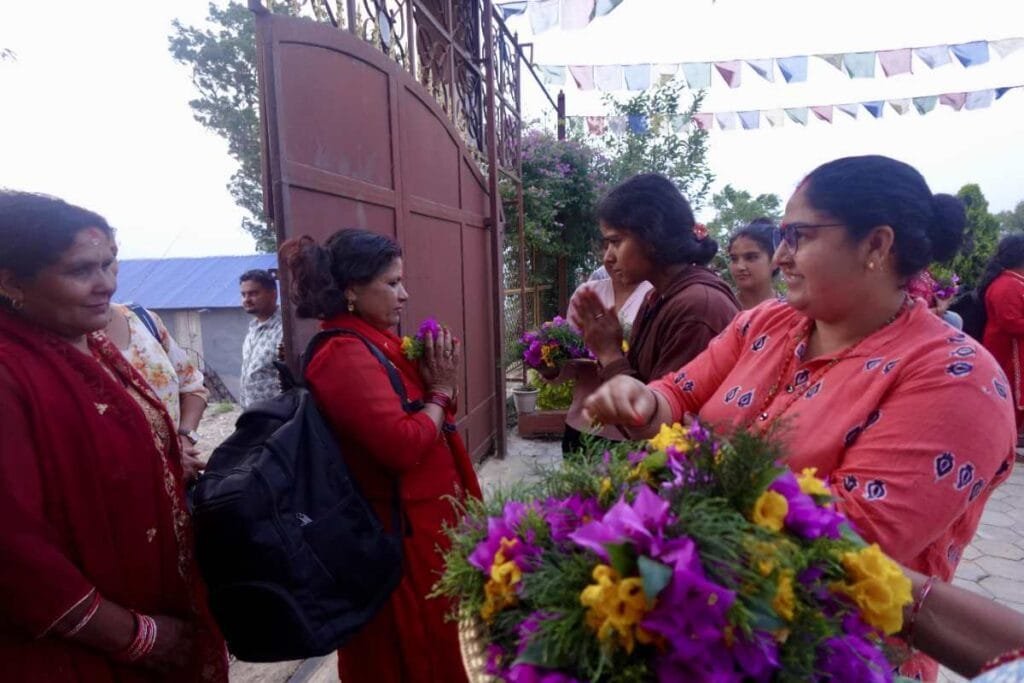

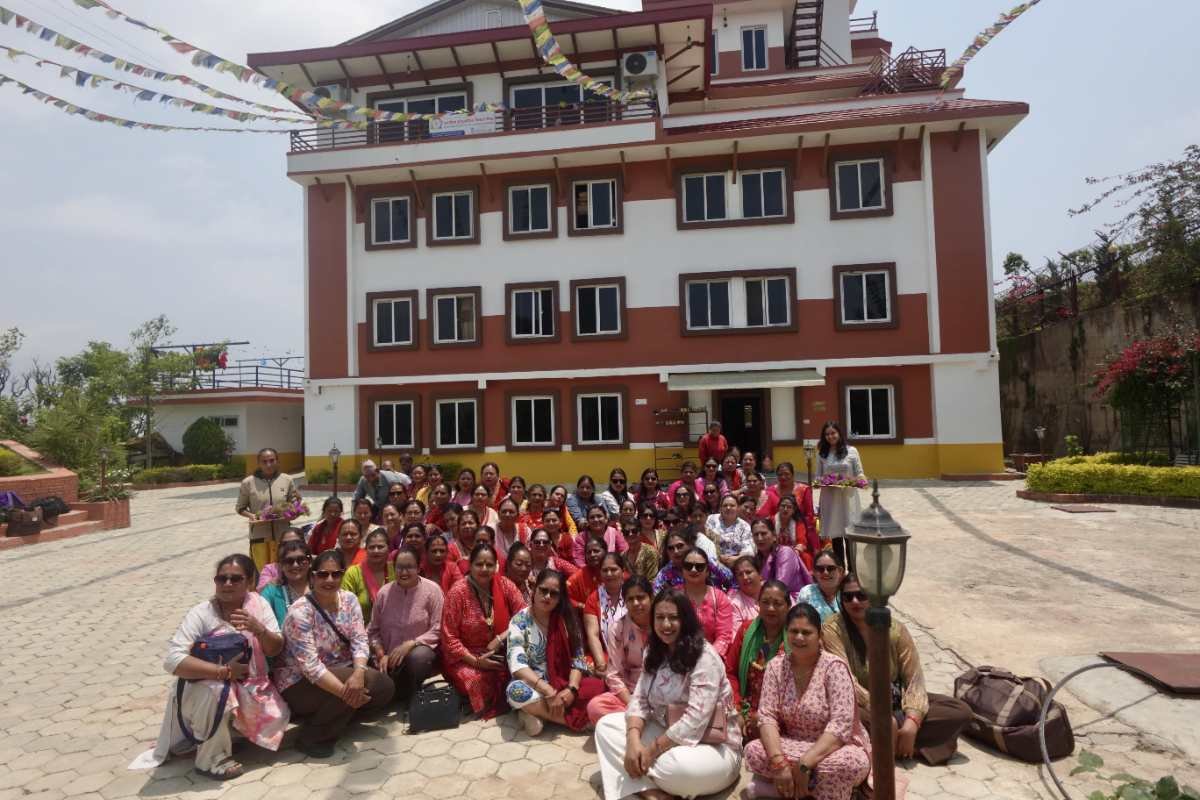
 Member of
Member of